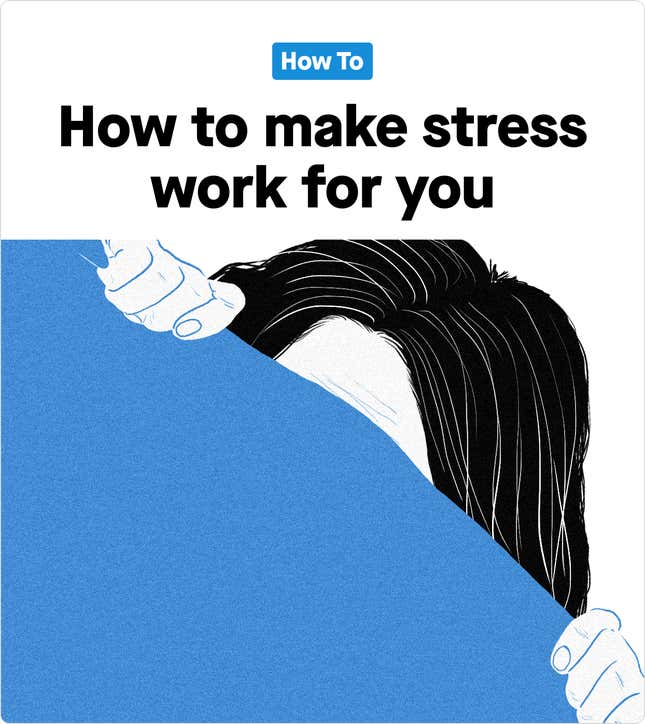
Hi Quartz members,
Two years of a pandemic have likely dispelled you of the illusion that wellness wares—crystals, microbiome powders, 12-pound blankets—can lead you to a stress-free life, if you ever believed it. Stress and pressure will find you, no matter how many self-care gadgets you have in your closet, and regardless of your station in life (though privilege and wealth can ease some burdens).
Fortunately, making futile attempts to hide from stress is not your only option. Yes, you need to manage your biological response to stressful situations and avoid burnout, but you can also learn to work with life’s pressures, rather than reflexively running away from them.
Call it “the next stop” in the evolution of western culture’s dominant approach to stress, says Dane Jensen, a Toronto-based consultant who has spent years examining how people perform under pressure. Decades ago, stress management first became a cultural preoccupation, he says, before an interest in resilience took hold. In recent years, more researchers have begun looking into the avantages of seeing stress as an asset. And while the idea that stress can improve our health and wellbeing isn’t new, the pandemic has likely made people more receptive to that message.
Here’s what these experts suggest will help you do that.
Wait, how is stress a good thing?
First, let’s be clear. Stress is neither a good or bad influence in your life. It simply exists. What makes it useful or debilitating is how you respond to it, according to Alia Crum, a Stanford psychologist. Her research into the mindsets people bring to stress has found that people who believe they can thrive despite stress are more likely to be healthier and more content. By contrast, psychologists have also found that people who try to minimize stress are more likely to experience depression, divorce, and job loss over time.
But those mindsets aren’t necessarily permanent. In her work, Crum has also found that people can change their relationship to stress. In a story for the New York Times, Crum outlined three essential steps to make this transition.
- Acknowledge your stress. And name the emotions it provokes. It shouldn’t be a hidden force.
- Own it. Singer Neil Young famously offered that only love can break your heart; Crum points out that only the things you care about will generate stress, so it’s worth investigating the deeper reasons why you’re worried or feeling anxious.
- Use it. Now that you’re familiar with the values that are connected to your stress, act on them and use them to pursue meaningful goals. During this pandemic, for example, recognizing what matters most to you might push you to support your community, she writes. That’s a more productive response than simply worrying.
Understand “the pressure equation”
Dane Jensen, the corporate consultant, urges his clients and readers to dig deep into the source of their anxieties to better understand how their unique stressors can drive growth, and how best to respond.
In his new book, he describe what he calls “the pressure equation,” a taxonomy of the three ingredients that shape pressurized moments:
- How important the outcome might be
- How much uncertainty someone is facing
- The volume of stress
A job interview is usually important and the outcome is uncertain, for example, but it might be that much more nerve-rattling when your meetings are stretched out over multiple meetings, increasing the volume of stress you’re under. An illness is always important, though how much pressure it generates might also depend on how much you can plan for a predictable outcome.
Understanding how importance, uncertainty, and volume can all play positive or negative roles in a stressful situation can also allow a person to respond strategically, Jensen proposes. Here are two examples:
During prolonged periods of high-volume pressure, find moments to reconnect with why your struggle matters. When you’re, say, dealing with a confluence of tough circumstances or or pushing toward a goal that calls for months of physical or emotional challenges, it’s easy to lose sight of the importance attached to the source of your hardship from under the volume of stress it’s creating, Jensen explains. You’re “just focused on one foot in front of the other until you kind of hit that point where you ask, ‘Why am I even doing this?’”
In those long hauls, he says, “clear a line of sight as to why this matters,” he says. Tell yourself, “This is a real slog, but at the end of the day, it’s making me stronger, or I’m contributing to my family, or to my team, or it’s bringing me closer to the people that I care about.”
Such occasional check-ins can help stave off burnout and cynicism. “In the grind, there are going to be moments of growth and we need to actually notice them and take the time to get the juice out of that lemon, because that’s what’s going to sustain us through the troughs,” says Jensen.
In “peak pressure” moments, remember what’s not at stake. During acute moments of pressure—public speaking events, big games, the moments you face a tough decision with little time to spare—focusing on the importance of what you’re doing can be crippling. In those often highly uncertain moments, says Jensen, “We do not need to be consciously thinking, ‘Oh my god this really matters to me,’ because it’s like, no crap this really matters to you!”
Instead, he advises disconnecting a bit. Think about all that is stable in your life—your friendships, your family, your health. Take a step back and use your ability to analyze the stress to ultimately get something good out of the situation.
A word of caution about self-care
When faced with tough times, resist the urge to sink into your sofa or comfort yourself with (potentially narcissistic) self-care routines, says psychiatrist Samantha Boardman. We’re better able to cope with stress when we turn outwards and stay active, she writes in her 2021 book Everyday Vitality. This means “having a good conversation, doing a favor for someone, going for a walk, reading an interesting article and then calling a friend to discuss it.” A major survey (PDF) from Harvard School of Public Health found that many similar basic actions—getting outdoors, spending time with others, practicing a hobby—were what most helped people feel recharged in stressful periods.
Keep learning
The scientist who coined the term “stress” wished he had used a different word for it (Quartz)
Psychologists say a good life doesn’t have to be happy, or even meaningful (Quartz)
In stressful times, make stress work for you (New York Times)
How to make stress your friend (Ted)
Post-Traumatic Growth: Finding meaning and creativity in adversity (Scientific American)
Have a perfectly pressureful weekend,
—Lila MacLellan, Quartz senior reporter (might still buy a 12-pound blanket)
One ⏱️ thing
Researchers in France have discovered that some people seek a state of “optimal busyness” at work. This private nirvana occurs when a person has just enough to do—any fewer tasks and they would be bored, any additional chores and they may start to feel overwhelmed. When someone experiences exactly the right amount of pressure, they can enter a pleasant state of flow, Quartz’s Cassie Werber reports.
According to the scientists who studied it, optimal busyness is “an attractive, short-lived temporal experience,” that some workers try to reproduce and prolong “because it makes them feel energized and productive as well as in control of their time.”
